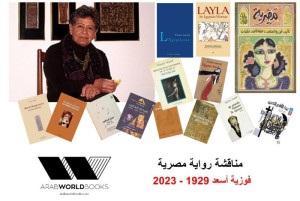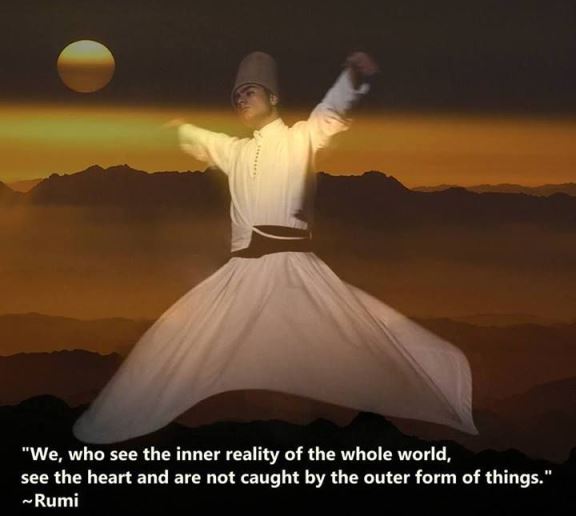"The very essence of Sufism is poetry, and the Eastern Mystics are never tired of expatiating on the 'Ishq or "love to God," which is the one distinguishing features of Sufi mysticism. The Masnawi, [of Rumi] which teaches in the sweetest strains that all nature abounds with love divine, that causes even the lowest plant to seek the sublime object of its desire; the works of the celebrated Jami, so full of ecstatic rapture; the moral lessons of the eloquent Sa'di; and the lyric odes of Hafiz, may be termed the Scriptures of the Sufi sect; and yet each of these authors contains passages which are unfit for publication in an English dress, and advocate morals at variance with what Christianity teaches us to be the true reflection of God's Holy Will (sic). Whilst propriety demands the suppression of verses of the character alluded to, we give a few odes as specimens of the highest order of Sufi poetry.
Jalalu 'd-din ar-Rumi, the author of the Masnawi (A.H. 670), thus writes: -
"I am the Gospel, the Psalter, the Qur'an;
I am 'Uzza and Lat - (Arabic deities) - Bell and the Dragon.
Into three and seventy sects is the world divided,
Yet only one God: the faithful who believe in Him am I.
Thou knowest what are fire, water, air and earth;
Fire, water, air, and earth, all am I
Lies and truth, good, bad, hard and soft.
Knowledge, solitude, virtue, faith.
The deepest ground of hell, the highest torment of the flames,
The highest paradise,
The earth and what is therein, the angels and the devils.
Spirit and man am I.
What is the goal of speech, O tell it Shams Tabrizi!
The goal of sense?
This: - The world Soul am I."
# # #
And again: -
"Are we fools? We are God's captivity.
Are we wise? We are His promenade.
Are we sleeping? We are drunk with God.
Are we waking? Then we are His heralds.
Are we weeping? Then His clouds of wrath.
Are we laughing? Flashes of His love."
# # #
Every night God frees the host of spirits;
Frees them every night from fleshly prison.
Then the soul is neither slave nor master;
Nothing knows the bondsman of his bondage:
Nothing knows the lord of all his lordship.
Gone from such a night, is eating sorrow;
Gone, the thoughts that question good or evil.
Then without distraction, or division.
In this One the spirit sinks and slumbers."
The following is from the mystic poet Mahmud: -
"All sects but multiply the I and Thou;
This I and Thou belong to partial being.
When I and Thou, and several being vanish,
Then mosque and church shall find Thee nevermore.
Our individual life is but a phantom,
Make clear thine eye, and see reality."
The following verses are by Faridu 'd-din Shakrgunj (A.H. 662):
"Man, what thou are is hidden from thyself;
Know'st not that morning, midday, and the eve
Are all within Thee? The ninth heaven art Thou;
And from the spheres into the roar of time
Didst fall ere-while. Thou art the brush that painted
The hues of all the world - the light of life
That ranged its glory in the nothingness."
"Joy! Joy! I triumph now; no more I know
Myself as simply me. I burn with love.
The centre is within me, and its wonder
Lies as a circle everywhere about me.
Joy! Joy! No mortal thought can fathom me.
I am the merchant and the pearl at once.
Lo! Time and space lie crouching at my feet.
Joy! Joy! When I would revel in a rapture.
I plunge into myself, and all things know."
Mr. Lane, in his Modern Egyptians, gives a translation of a Sufi poem recited by an Egyptian Darwesh: -
"With my love my heart is troubled: and mine eyelid hind'reth sleep;
My vitals are dissever'd; while with streaming tears I weep.
My union seems far distant; will my love e'er meet mine eye?
Alas! Did not estrangement draw my tears, I would not sigh
By dreary night I'm wasted; absence makes my hope expire
My tears, like pearls, are dropping, and my heart is wrapt in fire.
Whose is like my condition? Scarcely know I remedy.
Alas! Did not estrangement draw my tears, I would not sigh.
O turtle-dove! Acquaint me wherefor thus dost thou lament?
Art thou so stung by absence? Of thy wings depriv'd and pent?
He saith, 'Our griefs are equal: worn away with love. I lie.
Alas! Did not estrangement draw my tears, I would not sigh.
O First, and sole Eternal! Show thy favour yet to me
Thy slave, Ahmad El-Bekree, hath no Lord excepting Thee.
By Ta-ha, the Great Prophet! Do thou not his wish deny.
Alas! Did not estrangement draw my tears, I would not sigh."
Dr. Tholuck quotes this verse from a Darwesh Breviary: -
"Yesterday I beat the kettle-drum of dominion,
I pitched my tent on the highest throne;
I drank, crowned by the Beloved,
The wine of unity from the cup of the Almighty."
One of the most characteristic Sufi poems is the Persian poem by the poet Jami, entitled Salaman and Absal. The whole narrative is supposed to represent the joys Love Divine as compared with the defunct fascinations of a Life of Sense. The story that of a certain King of Ionia, who had a son named Salaman, who in his infancy was nursed by a young maiden named Absal, who, as he grew up, fell desperately in love with the youth, and in time ensnared him. Salaman and Absal rejoiced together in a life of sense for a full year, and thought their pleasures would never end. A certain sage is then sent by the king to reason with the erring couple. Salaman confesses that the sage is right, but pleads the weakness of his own will. Salaman leaves his native land in company with Absal, and they find themselves on an island of wonderful beauty. Salaman, unsatisfied with himself and his love, returns once more to his native country, where he and Absal resolve to destroy themselves. They go to a desert and kindle a pile, and both walk into the fire. Absal is consumed, but Salaman is preserved in the fire, and lives to lament the fate of his beloved one. In course of time he is introduced by the sage to a celestial beauty called Zuhrah, with whom he becomes completely enamoured, and Absal is forgotten.
" . . . Celestial beauty seen,
He left the earthly; and once come to know
External love, he let the mortal go."
In the epilogue to the poem, the author explains the mystic meaning of the whole story in the following language: -
"Under the outward form of any story
An inner meaning lies - this story now
Completed, do thou of its mystery
(Whereto the wise hath found himself a way)
Have thy desire - no tale of I and Thou,
Though I and Thou be its interpreters.
What signifies the King? And what the Sage?
And what Salaman not of woman born?
And what Absal who drew him to desire?
And what the Kingdom that awaited him.
When he had drawn his garment from her hand?
What means that Fiery Pile? And what the Sea?
And what that heavenly Zuhrah who at last
Clear'd Absal from the mirror of his soul?
Learn part by part the mystery from me;
All ear from head to foot and understanding be.
The incomparable Creator, when this world
He did create, created first of all
The first intelligence - first of a chain
Of ten intelligences, of which the last
Sole Agent is this our Universe,
Active intelligence so call'd, the one Distributor of evil and of good,
Of joy and sorrow. Himself apart from matter,
In essence and in energy - His treasure
Subject to no such talisman - He yet
Hath fashion'd all that is - material form,
And spiritual sprung from Him - by Him
Directed all, and in His bounty drown'd
Therefore is He that Firman-issuing King
To whom the world was subject. But because
What he distributes to the Universe
Himself from still higher power received,
The wise, and all who comprehend aright,
Will recognise that higher in the Sage.
His the Prime Spirit that, spontaneously
Projected by the tenth intelligence,
Was from no womb of matter reproduced
A special essence called the Seal - a child
Fresh sprung from heaven in raiment undefiled
Of sensual taint, and therefore call'd Salaman.
And who Absal? - The lust-adoring body,
Slave to the blood and sense - through whom the Soul,
Although the body's very life it be,
Does yet imbibe the knowledge and desire
Of things of sense; and these united thus
By such a tie God only can unloose,
Body and soul are lovers each of other.
What is the Sea on which they sail'd? - the Sea
Of animal desire - the sensual abyss,
Under whose waters lie a world of being
Swept far from God in that submersion.
And wherefore was Absal in that Isle
Deceived in her delight, and that Salaman
Fell short of his desire? - that was to show
How passion tires, and how with time begins
The folding of the carpet of desire.
And what the turning of Salaman's heart
Back to the King, and looking to the throne
Of pomp and glory? What but the return
Of the lost soul to its true parentage,
And back from carnal error looking up
Repentant to its intellectual throne.
What is the Fire? Ascetic discipline,
That burns away the animal alloy,
Till all the dross of matter be consumed
And the essential Soul, its raiment clean
Of mortal taint, be left. But forasmuch
As, any life-long habit so consumed,
May well recur a pang for what is lost,
A soothing phantom of the past, but still
Told of a better Venus, till his soul
She fill'd, and blotted out his mortal love.
For what is Zuhrah? - That divine perfection,
Wherewith the soul inspir'd and all array'd
Its intellectual light is royal blest,
And mounts the throne, and wears the crown, and reigns
Lord of the empire of humanity.
This is the meaning of this mystery,
Which to know wholly ponder in the heart,
Till all its ancient secret be enlarged.
Enough - the written summary I close,
And set my seal:
THE TRUTH GOD ONLY KNOWS."
Sufi Poetry
Upcoming Events

Joseph Conrad's Heart of Darkness Discussion
April 27, 2024
Join us for a special discussion of Joseph Conrad&...

A writer, a vision, a journey: a conversation with Francis Boyle
February 24, 2024
This event took place on 24 February 2024 Yo...

Discussion of Fawzia Assaad’s An Egyptian Woman
November 25, 2023
In celebration of the life and outstanding achieve...

Toni Morrison's The Bluest Eye, A Presentation and Discussion
October 28, 2023
This presentation and discussion of Toni Morrison&...
